|
29/01/2002
THE DIPLOMATIC LETTER N°56
Economic Growth
and EU Membership:
Top Priorities for Croatia
 H.E.
Bozidar Gagro, the Ambassador of Croatia to France, speaks of his country's regional
role and the political and economic challenges it must overcome in its campaign
to join the EU, underscoring French interests in future developments in Croatia. H.E.
Bozidar Gagro, the Ambassador of Croatia to France, speaks of his country's regional
role and the political and economic challenges it must overcome in its campaign
to join the EU, underscoring French interests in future developments in Croatia.
 Version
française/french version
Version
française/french version
THE
DIPLOMATIC LETTER:
Mr. Ambassador, in light of Croatia's position within Europe and in Southeast
Europe, would you describe the primary objectives of Croatian foreign policy for
our readers? What role would your country like to play on the regional stage?
HIS
EXCELLENCY BOZIDAR GAGRO:
Our primary objective is to join the European
Union as soon as possible. First and foremost, because we feel very firmly
that we are an integral part of Europe, in terms of our geography, history and
culture. Another reason we chose this direction is because we see EU membership
as the best way to speed up our own development. We have also taken note of the
tremendous progress in various countries, both during the preparation process
and since they have been EU members. Spain, Portugal, Greece and Ireland all come
to mind. This progress is due not only to the aid provided through European funds,
but primarily to the restructuring and modernizing of their respective economies,
and to aligning their legislation on EU norms. In addition to this rapprochement
with the European Union, Croatia, with its security in mind, is already building
closer ties with the Atlantic Alliance in view of becoming
a full-fledged member.
With this ultimate goal ever in mind, Croatia has nonetheless remained active
in several regional associations and organizations with economic and political
agendas. This is the case, for instance, with the Central European Initiative
(CEI), and with the Stability
Pact.
Finally, good relations with neighboring countries is naturally a prerequisite
to any wider form of integration. As we all know, ten years ago Croatia went through
a very painful crisis that was the direct result of the breakup of the former
Yugoslavia and the resulting war. I am happy to confirm, as is rightly noted in
political circles, that Croatia is no longer part of the regional problem, but
part of its solution. This does not mean Croatia has any intention of playing
a leadership role, but merely that it will meet its responsibilities. We still
have to work out a few minor border issues with Slovenia and, more importantly,
with the Federal Republic of Yugoslavia. There is
also the very thorny question of the return of refugees and, above all, the complex
situation that continues to prevail in Bosnia-Herzegovina. In any case, these
issues are not pressing enough to disturb our calm approach to building good future
relations with our regional partners.
| CROATIA:
A STRONG REGIONAL ROLE TARGETING EUROPEAN AND ATLANTIC INTEGRATION |
|
A vital
link between the Mediterranean and Central and Southeast Europe, Croatia plays
a key role in ensuring regional stability. Fully aware of this pivotal position,
Croatia has made foreign policy a top priority, with European
and Atlantic integration as its end goal.
Just ten years after claiming independence (on 25 June 1991),
and despite numerous obstacles, including the consequences of a ruinous 5-year
war (1990-1995), Croatia now has a dynamic economy. This vitality, albeit fragile,
is very encouraging. It has put Croatia in a strong position amongst its Central
European neighbors, and helped the country move steadily closer to EU
membership. In terms of its level of development, Croatia now stands on a
favorable footing with the former Communist countries of East Europe. In addition
to the economic consequences of the war, Croatia has had to overcome a dual challenge:
founding a Nation-State, and recentering the country's economy in the capital
Zagreb, which had been drained of its resources for nearly 70 years.
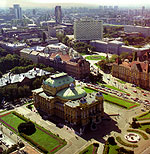 Croatia
now conducts close to 60% of its foreign trade with the European Union. The new
Agreement of Stabilization and Association (ASA)
between Croatia and the European Union, signed on 14 May 2001, should further
boost the flow of trade in years to come. The ASA is the first accord establishing
institutional ties between Croatia and the European Union. Not only will it shore
up current bilateral relations, it is the first step in an ambitious reform project
that will affect every aspect of the country. Croatia
now conducts close to 60% of its foreign trade with the European Union. The new
Agreement of Stabilization and Association (ASA)
between Croatia and the European Union, signed on 14 May 2001, should further
boost the flow of trade in years to come. The ASA is the first accord establishing
institutional ties between Croatia and the European Union. Not only will it shore
up current bilateral relations, it is the first step in an ambitious reform project
that will affect every aspect of the country.
Croats are looking to France for support in their campaign to achieve political,
economic and military integration with European institutions. France could benefit
considerably from the new opportunities on the Croatian market, especially within
the scope of the country's wide-reaching privatization
program. Since the May 2001 visit to Paris by Croatian
Prime Minister Ivan Racan and the Minister of the Economy, Mr. Fizulic, several
French firms have shown a growing interest in Croatia, led by Airbus, Accor, Hachette,
BNP Paribas, Bouygues, Golfs de France, PSA-Peugeot/Citroën, SPIE Batignoles
and Dreyfus. The Croatian government has made it clear that it is looking for
partners, displaying a special interest in investments which include technology
transfers and get Croatian industries directly involved in product development.
The coalition government has achieved concrete results in its first year in office,
on both the domestic and international fronts. This has done a great deal to improve
Croatia's standing in the international arena. Croatia now favors "multiple
regional cooperation," in the words used by Prime Minister Ivan Racan during
a conference at the IFRI last May.
I.C.
|
How
do you explain the breakup of the Yugoslav Federation, ten years after Croatia
gained independence? What are your thoughts on the way events have unfolded in
the Balkans? What conditions will have to be met in order to bring lasting stability
to the region?
The oft
heard idea that it might have been possible - even desirable - to preserve the
former Yugoslavia is pure speculation, with very little foundation in serious
political analysis. Once the great expansion of Europe had been set in motion
towards the unification of only sovereign peoples, Yugoslavia, like the USSR and
Czechoslovakia, lost virtually all chance of survival. What is more, I have never
laid any credence in the theory that so-called "ancestral hates" stirred
up the crisis and brought on the final breakup
of the former Yugoslav Federation. On the other hand, I am convinced that the
various components of the federation had developed hopelessly conflicting interests:
the smaller communities wanted more autonomy, while the largest group sought ever
greater hegemony. Moreover, we cannot forget the rigid, conservative and frankly
reactionary character of the federal bureaucracy, which opposed all change. This
was particularly true of the army, in my opinion.
The international community finally managed, with great difficulty, to contain
the crisis in Bosnia-Herzegovina. After an even more forceful intervention, it
brought the situation in Kosovo under control. But the unrest, which is an indirect
result of the fire of contention sparked by Milosevic, has finally spread to Macedonia.
One of Macedonia's Albanian leaders even declared this past summer that their
rebellion was the final act in the breakup of the former Yugoslavia. We have very
good reason to wonder if it will ever end! There is still the possibility that
Podgorica will pass a referendum in favor of independence, which would result
in the separation of Serbia and tiny Montenegro, most likely on friendly terms.
That possibility raises questions that seem much less dramatic today than they
did back in 1991. In fact, the international
community appears to be much more concerned about them than Belgrade itself.
It is, nonetheless, unlikely that there will be real stability in the Balkans
anytime in the near future. The seat of unrest has shifted to the south, primarily
to the area populated by Albanians. Slovenia, another former Yugoslav republic,
has long considered itself to be safeguarded from the upheaval in the Balkans,
and quite rightly. Croatia, for its part, is no longer concerned by the principal
problems. But the other countries in the region are still affected, to a greater
or lesser degree, by this zone of unrest.
Ten
years ago, Mr. Stepjan Mesic told Milosevic he would end up swinging from a rope.
He now says he is willing to testify against Milosevic. Do you think it is really
his place, as President of Croatia, to take on that role? Couldn't it endanger
the friendly relations between your two countries, which have been so very difficult
to rebuild?
The President
of Croatia, Stepjan Mesic, has said in the past that he was willing to testify
against Milosevic in The Hague. Let me underscore the fact that the International
Criminal Tribunal (ICT) has brought three different counts of indictment,
each one of the utmost gravity. We must not forget that the former president of
Yugoslavia is accused of crimes against humanity in Croatia and Kosovo, and of
genocide in Bosnia-Herzegovina. What's more, Serbs will also undoubtedly come
forward to testify against him. As the Croatian President has said on several
occasions, Milosevic is accountable to the Serbian people just as well. There
is absolutely no reason for this to harm our relations. Moreover, Mr. Mesic has
already gone before the ICT as a witness back in January 2000, long before becoming
the president of Croatia. It did spark the ire
of certain political circles in Croatia at the time, mainly because he denounced
Franjo Tudjman's policies in Bosnia.
President Mesic is a man of rare integrity who is not afraid to speak his mind.
But personally, I do not think he will testify in The Hague again. There are many,
many other witnesses who have just as much to say.
| PARIS
- ZAGREB: A FULL OF PROMISE COOPERATION |
|
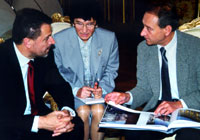
The first official visit between the mayors of Paris and Zagreb. The visit
to Paris from 6 to 9 November 2001 by the Mayor of Zagreb, Milan Bandic, was an
important first step in the campaign launched by the capitals' representatives
to strengthen their political, cultural and economic ties. During his stay Mr.
Bandic put forward a proposal for a cooperation and friendship agreement at the
municipal level.
Mr. Bandic also took advantage of his visit to present Zagreb's candidacy for
membership in the Metropolis organization, which links 75 large cities around
the globe. Zagreb was formally admitted as a member on 18 December, to Paris.
The Mayor of the Croatian capital also met with representatives from the French
business world, led by firms interested in projects for renovating municipal infrastructures
(public transportation networks, water treatment and distribution, energy transportation,
etc.) such as Eiffage, RATP, Alstom, Vivendi Environnement, and Europtima.
|
How
are Croatia's current relations with Serbia and Bosnia?
We consider
our relations with Bosnia-Herzegovina and Serbia to be of the utmost importance.
Apart from two questions over borders - one along the Danube, and the other at
the mouth of Kotor Bay, across from Montenegro - Croatia does not have any territorial
disputes with present-day Yugoslavia. The Croatian government and the Croatian
people welcomed the democratic shift in Serbia
after the elections on 24 September 2000, and the ousting of Milosevic. Were it
not for the palpable scars from the war and the attacks waged against Croatia
in 1991, which are still strongly felt in certain regions, it would undoubtedly
have taken much less time to reestablish normal ties with democratic Serbia. There
is tremendous potential that could be tapped by building stronger ties between
our two countries. No one understands this better than businessmen. Entrepreneurs
from both countries have already taken the very first concrete steps in this direction.
As concerns Bosnia-Herzegovina, it is important to understand that its independence
and territorial integrity are imperative not only to finding a political solution
to its internal problems, but also to guaranteeing the stability of the entire
region. This principle is square one of Croatia's policy towards Bosnia-Herzegovina.
The Dayton Accords, however imperfect, did identify this as the primary condition.
All serious doubts on this issue have since disappeared. Having said that, the
internal integration process has been very difficult and is still extremely shaky.
One thing is certain: the representatives of the international community no longer
come to Zagreb looking for a solution acceptable to the Croats in Bosnia-Herzegovina.
As a cosigner of the Dayton Accords, Croatia is certainly not indifferent to what
is happening in our neighboring country. We do however believe that Bosnia-Herzegovina's
local democratic institutions alone are capable of coming up with effective consensual
solutions.
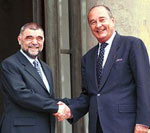 |
On the heels of Croatian President Stjepan Mesic's visit
to France in May 2000, the visit to Croatia on 9 November 2000 by French Minister
of Foreign Affairs Hubert Vedrine, and the Zagreb
Summit on 24 November 2000, Croatian Prime Minister Ivica Racan's state visit
to Paris on 14 May of this year offered further proof of France and Croatia's
excellent bilateral relations and their desire
to enhance them.
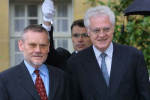 The
visit took place on the same day as the signing of the Stabilization and Association
Agreement between Croatia and the European
Union. President Chirac's recent visit
to Zagreb, in December 2001, further bolstered the very promising relations between
France and Croatia. The
visit took place on the same day as the signing of the Stabilization and Association
Agreement between Croatia and the European
Union. President Chirac's recent visit
to Zagreb, in December 2001, further bolstered the very promising relations between
France and Croatia. |
Despite
the ousting of Milosevic and his arrest and transfer to the ICT, relations remain
strained. After the dangers posed by Greater Serbia, are you afraid of the Greater
Albania beginning to take shape with the crisis in Macedonia?
No one
knows what is going to happen in Kosovo, or in western Macedonia. One thing is
certain: if the Albanians repeat the errors of the Serbian nationalists who dreamed
of building Greater Serbia, they will only cause new material damage and even
greater human suffering. They too will ultimately suffer a resounding defeat.
First of all, experience has shown that anachronic political projects of this
sort are doomed to fail. Secondly, the international community has chalked up
experience in this area, after its first faltering attempts in Croatia and Bosnia-Herzegovina.
It will not let things get out of hand, especially now that it has international
forces in the area.
There is still very good reason to believe that the situation will eventually
improve. The elections held in Kosovo on 17 November offer a ray of hope. Isn't
it possible that the ethnic Albanians in Kosovo, Macedonia and Albania will one
day feel reassured that their rights are respected in the countries in which they
live, and will thus encourage each other to embrace what I would term a "plural
ethnic group," which would respect their similarities as well as the individual
nuances of each branch of the Albanian nation? This could lead to the creation,
sometime in the future, of different institutional structures on the different
sides of the current federal and national borders - if they are maintained. But
it is of utmost importance that these borders not be changed unilaterally or,
even worse, by force.
Let's
turn to the issue of international security. During a conference
at the French Institute of International Relations, Croatian Prime Minister Ivica
Racan said that joining NATO was the country's primary objective. Do you agree
that the Atlantic Alliance is the best way to safeguard peace in Europe? If so,
where does the Common Foreign and Security Policy fit in with this?
 |
|
Croatia's Adriatic coast, led by the port of Rijeka (above-mentionned), in front
of the Peninsula of Istria, is of vital importance to the country's tourism
and sea transport industries. The region's seaside resorts where the first areas
to experience a mild revival of activity in the tourism industry. |
The biggest
and undeniable advantage of the Atlantic Alliance is that it already exists. The
Common Foreign and Security Policy, on the other hand, is still a largely "virtual"
entity. In view of the unexpected developments on the international stage, there
has been much talk recently of making major changes in NATO and in its role for
the future. This has been spurred primarily by the new world order that is steadily
taking shape with the unexpected involvement of Russia and China, even Iran, in
the coalition against international terrorism. This has not, however, had any
apparent impact on the project to build a stronger partnership with the European
members of the Alliance, in view of NATO's eastern enlargement. It is no coincidence
that almost every country in Central and Eastern Europe would like to join NATO.
Ten European countries are already waiting in line. Croatia cannot afford to remain
by itself on the sidelines, even if it does later take its rightful place in the
European defense system, once it has been set up. Croatia is still in the "intensive
talks" stage with the Alliance. The next stage is called the "MAP":
the Membership Action Plan. It is the very last step before membership. Croatia
is already partly covered by the NATO umbrella, which is reflected in the increased
confidence foreign investors have shown in the Croatian market.
It
has taken longer than expected to set up a market economy in Croatia. What is
holding up the reforms? Would you outline the government's priorities in this
area for our readers?
No one
expected this process to be so difficult, or that there would be so many setbacks
in the early 1990s. Croatia has been forced to simultaneously privatize and restructure.
Many companies were privatized in a rather dubious manner, to say the very least.
Vague laws and collusion between unscrupulous buyers and political officials are
the principal reasons why various companies, both large and small, have been swindled
or pushed into bankruptcy. This explains why the great majority of the Croatian
public was calling for a systematic review of the legality of all prior privatizations
on the eve of the parliamentary elections held
in early January 2000. The key reasons behind the rapid deindustrialization of
the country during this bygone period have yet to be identified. It was most likely
caused by the combination of a deliberate choice to abandon unprofitable programs,
on the one hand, and on the other, an attitude I would describe as "irresponsible"
since it brought on the well-known adverse effects of "unrestrained economic
liberalism." In light of past mishaps, the entities that now manage these
specialized public funds are being extremely vigilant. They do not move forward
before obtaining all the necessary guarantees as to the quality of the restructuring
or the consolidation proposed by the company or the sector in question. In other
words, they verify that they are truly capable of carrying out the privatization
in optimal conditions.
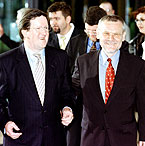 |
|
As far as joining NATO is concerned, the Croatian government already met one of
the main goals on its agenda
for 2000-2004 when Croatia became a member of the Partnership for Peace on 25
May 2000. The Secretary-General of NATO, Lord Robertson, welcomed Croatia by expressing
his satisfaction with the new government's policies, encouraging Croatia to serve
as an example for other countries in the region. Five days later Croatia became
an associate member of NATO's Parliamentary Assembly, the highest possible standing
for countries participating in the Partnership for Peace program. (Photo: Lord
Robertson, NATO Secretary General, and Mr. Ivica Racan, the Prime Minister of
Croatia). |
Croatia
is a country with great tourism potential. There is a very pressing need to privatize
our tourism infrastructure. Other sectors
have kept their monopolies intact. This is true in the electricity industry, with
gas distribution, as well as transport companies. In these areas, the "maturation"
process is going to take a little longer. After selling off the majority of its
holding in the highly valuable national telecommunications company, the Croatian
government is once again pushing forward in this same direction. It is getting
ready to sell Croatia's largest insurance company, a stake in its leading petroleum
group INA, two or possibly three banks, and a number of smaller firms.
The
European Union accounts for two-thirds of total foreign investment in Croatia,
with just 2 % coming from France. Does Croatia offer any business opportunities
of particular interest to French industrialists? During a visit
to France by Zeljko Pecek, Croatian Minister of Small
and Medium Businesses, the groundwork was laid for a cooperation agreement
between French and Croatian small- and medium-sized businesses. Will this open
up new prospects for French firms in Croatia?
While Croatia
has no shortage of capital, like most countries in transition it does need foreign
investment first and foremost. Recent legislative reforms have heightened
the transparency of Croatian procedures, opening the way for greater opportunities.
The basic legal framework is already in place. An agreement designed to encourage
investments was signed in 1996, while the accord between France and Croatia aimed
at eliminating double taxation will come into effect very shortly, to mention
just two examples.
Trade between France and Croatia
has grown steadily in recent years, climbing to $US 560 million in 2000. Croatian
exports to France grew by 35% over the first eight months of 2001. French exports
to Croatia fell 15% over the same period. France still has an annual trade surplus
with Croatia of roughly $US 200 million. As a trade partner,
France has lost considerable ground to Germany and Italy, Croatia's leading supplier
and leading client. France was nonetheless Croatia's 6th supplier and 7th client
in 2000, which offers encouraging proof that trade between our countries continues
to steadily grow. France's market share currently stands at 7.1%. It could be
expanded in the consumer goods and food sectors, where France has yet to make
a real mark. The expansion of Croatia's tourism infrastructures is another one
of our leading objectives. France's specialized firms are highly renowned for
their skills and know-how in this sector. If they put forward higher quality offers,
and help Croatia fight unemployment, they will win our government's support.
|
BIOGRAPHY |
|
H.E.
Bozidar GAGRO
Born in 1938 in Hodbina, Bosnia-Herzegovina, H.E. Bozidar Gagro holds a degree
in Literature from the University of Zagreb (1960), where he taught from 1960
until 1982. During the course of a prestigious academic career he published numerous
works as both a historian and an art critic, and translated several texts written
in French and Italian. He then moved into public service, holding a wide array
of duties with various international organizations, including serving as an UNESCO
Advisor to several missions in Africa. From 1982 until 1987 he was the Minister
of Education and Culture in the government of the Socialist Republic of Croatia.
He then successively held the duties of Ambassador of the former-Yugoslavia to
France (1988-1991, resigning from his post in September 1991), Deputy-Minister
for Foreign Affairs of the Independent Republic of Croatia (1991-1992), Representative
and Ambassador Plenipotentiary of the Republic of Croatia to the Council of Europe
and the European Parliament in Strasbourg (1993-1996), and Ambassador of the Republic
of Croatia to Morocco (1996-2000). H.E. Bozidar Gagro took up his duties as the
Ambassador of the Republic of Croatia to France on 6 November 2001.
|
|